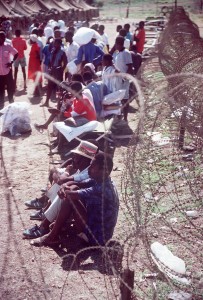Today Marks 20 Year Anniversary of Order that Closed “H.I.V. Prison Camp” at Guantánamo
Today in 1993, Federal Judge Sterling Johnson Jr. of the United States District Court in Brooklyn ordered the closure of a refugee camp at Guantánamo that was being used to detain Haitians who tested positive for HIV, the virus that causes AIDS.

Guantanamo Bay, Cuba (Dec. 15)–Haitians pass the day away awaiting processing in a tent city at the naval base Guantanamo Bay, Cuba. USCG photo by PA3 Eric Eggen.
In his ruling, Judge Johnson wrote: “Although the defendants euphemistically refer to its Guantánamo operation as a ‘humanitarian camp,’ the facts disclose that it is nothing more than an H.I.V. prison camp presenting potential public health risks to the Haitians held there.” He later added, “The Haitians’ plight is a tragedy of immense proportion, and their continued detainment is totally unacceptable to this court.”
Haitians were brought to Guantánamo after President George H.W. Bush ordered they be intercepted on the high seas and held at the naval base before reaching U.S. shores. Refugees began fleeing Haiti in droves after a surge of political violence and repression. Although they qualified for political asylum, U.S. officials ordered hundreds of Haitians to be indefinitely detained in makeshift camps in squalid conditions without legal representation because they tested positive for the virus.
Although Judge Johnston’s historic ruling brought the refugees’ nearly 20 months of confinement to a close, the camps were not emptied until June 18. Jean-Robert Germain, a 32-year-old electrician who planned to join a sister who then lived in South Florida, expressed a lingering uncertainty even as detainees began to be transported to the U.S.: “I don’t know if I am going to paradise, but at least I know that I am going to be leaving hell.”
The ruling also tested Bill Clinton’s commitment to close the camp just months after he began his first term as president. Like President Obama, on his campaign trail to the White House he promised to reverse the Bush administration’s policies at Guantánamo and close the controversial detention facility that had been established there.
